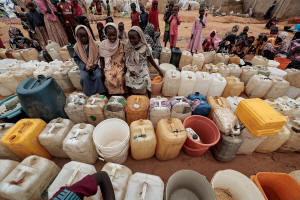|
The
worst hit areas include the capital Khartoum, the western region
of Darfur, and parts of Kordofan, all of which have seen
fighting, attacks and looting since the war broke out in
mid-April, according to the Integrated Food Security
Classification (IPC), a partnership of U.N. agencies, NGOs and
other groups.
The conflict between Sudan's army and the paramilitary Rapid
Support Forces (RSF), which erupted amid disputes over an
internationally backed plan for a transition to civilian rule,
has led to the displacement of more than 3 million people within
Sudan and forced more than 900,000 to flee to neighbouring
states.
Disruption of supply chains, population displacement, and damage
to infrastructure caused by the conflict were all contributing
to rising hunger, according to data released by the IPC late on
Wednesday.
"The results reflect a significant increase in the expected
magnitude of the food insecurity situation," the IPC said,
adding the number facing acute hunger and in need of urgent
support was 8.6 million than during the same period last year.
The United Nations had earlier forecast that 19.1 million people
would be going hungry by August. Farmers told Reuters that their
inability to plant crops could accelerate the spread of hunger.
During the harvesting season between October 2023 and February
2024 the number facing acute food insecurity is forecast to drop
back to about 15 million, though that would still be the highest
figure on record during that period, the IPC said.
Residents across Sudan have reported worsening conditions,
including power cuts that have recently lasted for days at a
time in some areas, shortages of medicine, and communications
blackouts.
Aid agencies have struggled to deliver relief.
Rights group Amnesty International reported on Thursday that
extensive war crimes were being committed in Sudan, with
civilians killed in both deliberate and indiscriminate attacks.
Reuters reported last week that the civilian death toll in
Khartoum was much higher than official figures suggest, as
residents are trapped between RSF occupation on the ground and
army air strikes and bombardment.
(Reporting by Nafisa Eltahir and Khalid Abdelaziz; Writing by
Aidan Lewis; Editing by Conor Humphries)
[© 2023 Thomson Reuters. All rights
reserved.] Copyright 2022 Reuters. All rights reserved. This material may not be published,
broadcast, rewritten or redistributed.
Thompson Reuters is solely responsible for this content.

|
|




